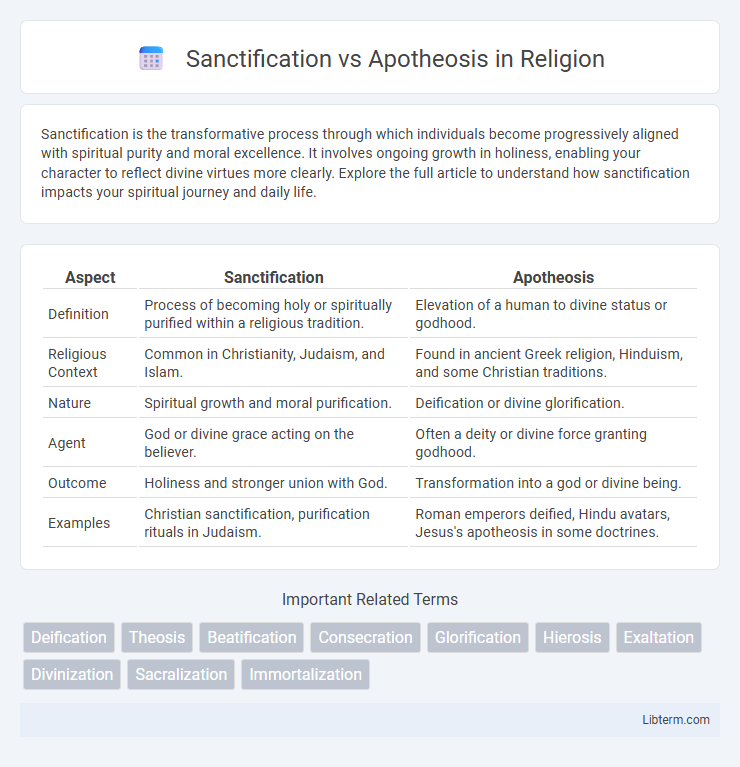Sanctification is the transformative process through which individuals become progressively aligned with spiritual purity and moral excellence. It involves ongoing growth in holiness, enabling your character to reflect divine virtues more clearly. Explore the full article to understand how sanctification impacts your spiritual journey and daily life.
Table of Comparison
| Aspect | Sanctification | Apotheosis |
|---|---|---|
| Definition | Process of becoming holy or spiritually purified within a religious tradition. | Elevation of a human to divine status or godhood. |
| Religious Context | Common in Christianity, Judaism, and Islam. | Found in ancient Greek religion, Hinduism, and some Christian traditions. |
| Nature | Spiritual growth and moral purification. | Deification or divine glorification. |
| Agent | God or divine grace acting on the believer. | Often a deity or divine force granting godhood. |
| Outcome | Holiness and stronger union with God. | Transformation into a god or divine being. |
| Examples | Christian sanctification, purification rituals in Judaism. | Roman emperors deified, Hindu avatars, Jesus's apotheosis in some doctrines. |
Understanding Sanctification: Definition and Origins
Sanctification refers to the process of becoming holy or spiritually purified, rooted in religious traditions such as Christianity, where it denotes the divine act of setting a person apart for sacred purposes. Its origins trace back to biblical texts, particularly within the New Testament, emphasizing transformation through faith, grace, and the indwelling of the Holy Spirit. This concept contrasts with apotheosis, which involves the elevation of a human to divine status, highlighting sanctification's focus on moral and spiritual growth rather than deification.
What is Apotheosis? Historical Context and Meaning
Apotheosis refers to the elevation of an individual to divine status, often seen in ancient cultures where emperors or heroes were deified after death, such as Roman emperors being declared gods. Historically, apotheosis signified ultimate glorification and transcendence beyond mortal limitations, symbolizing the merging of human and divine realms. This concept contrasts with sanctification, which in religious contexts denotes the process of becoming holy or set apart without necessarily achieving divine status.
Key Differences Between Sanctification and Apotheosis
Sanctification refers to the process of becoming holy or spiritually pure, often within a religious context involving moral transformation and divine grace. Apotheosis denotes the elevation of a person to divine status, typically representing deification or the moment of being revered as a god. Key differences include that sanctification emphasizes ongoing spiritual growth and moral improvement, while apotheosis is a singular event signifying ultimate exaltation and divine recognition.
Sanctification in Religious Traditions
Sanctification in religious traditions refers to the process of becoming holy or spiritually pure, often involving moral transformation and divine grace. It is emphasized in Christianity as a lifelong journey toward Christlikeness through prayer, obedience, and the work of the Holy Spirit. Unlike apotheosis, which elevates a person to divine status, sanctification maintains a clear distinction between the human and the divine.
Apotheosis Across Cultures and Mythologies
Apotheosis, the elevation of a mortal to divine status, appears across numerous cultures and mythologies, illustrating its universal appeal as a symbol of ultimate honor and transcendence. In ancient Greek mythology, heroes like Heracles were granted apotheosis, becoming gods after their heroic deeds, while in Norse mythology, certain warriors could ascend to Valhalla, achieving a form of divine glorification. This concept is mirrored in Egyptian mythology, where pharaohs were considered gods on earth, embodying the fusion of human and divine through apotheosis.
Theological Perspectives on Sanctification
Sanctification in Christian theology refers to the process by which believers are progressively made holy through the work of the Holy Spirit, reflecting God's grace and moral transformation. It emphasizes moral purity, obedience to God's commandments, and spiritual growth within the framework of salvation. Unlike apotheosis, which implies a human becoming divine, sanctification maintains the distinction between Creator and creature, underscoring sanctity as participation in divine life rather than divinization itself.
Apotheosis in Art, Literature, and Popular Culture
Apotheosis in art, literature, and popular culture symbolizes the elevation of a figure to divine status, often depicted through grandiose imagery and heroic narratives that emphasize transcendence and idealization. In classical art, apotheosis scenes celebrate mythological heroes or rulers ascending to godhood, while literature uses this motif to explore themes of transformation and ultimate glorification. Contemporary popular culture adapts apotheosis through cinema, comics, and video games, portraying characters who undergo a metamorphosis into superhuman or godlike beings, reinforcing their symbolic power and cultural resonance.
Spiritual Transformation: Sanctification vs Apotheosis
Sanctification involves the progressive spiritual transformation of a believer through divine grace, emphasizing purification and holiness in alignment with religious teachings. Apotheosis, by contrast, represents the elevation of a mortal to divine status, often symbolizing ultimate perfection or deification beyond spiritual growth. This distinction highlights sanctification as an ongoing process of moral and spiritual refinement, whereas apotheosis signifies the culmination of transcendence into godhood.
Modern Interpretations and Relevance
Modern interpretations of sanctification emphasize spiritual growth and moral purification within religious frameworks, highlighting an ongoing process of becoming holy through divine grace and personal effort. Apotheosis, often viewed in contemporary contexts as symbolic or mythological, represents the elevation of individuals to divine status, reflecting cultural ideals of transcendence and heroism rather than literal deification. Contemporary relevance lies in how sanctification informs ethical living and spiritual development, while apotheosis influences popular culture, leadership narratives, and the human quest for meaning beyond mortality.
Conclusion: Sanctification and Apotheosis Compared
Sanctification involves the process of becoming holy through spiritual growth and divine grace, emphasizing moral purification and alignment with sacred virtues. Apotheosis refers to the elevation of an individual to divine status, often seen in mythological or religious contexts as deification or exaltation. Comparing these concepts highlights sanctification as an internal transformation toward holiness, while apotheosis represents an external bestowal of divine honor or status.
Sanctification Infographic

 libterm.com
libterm.com